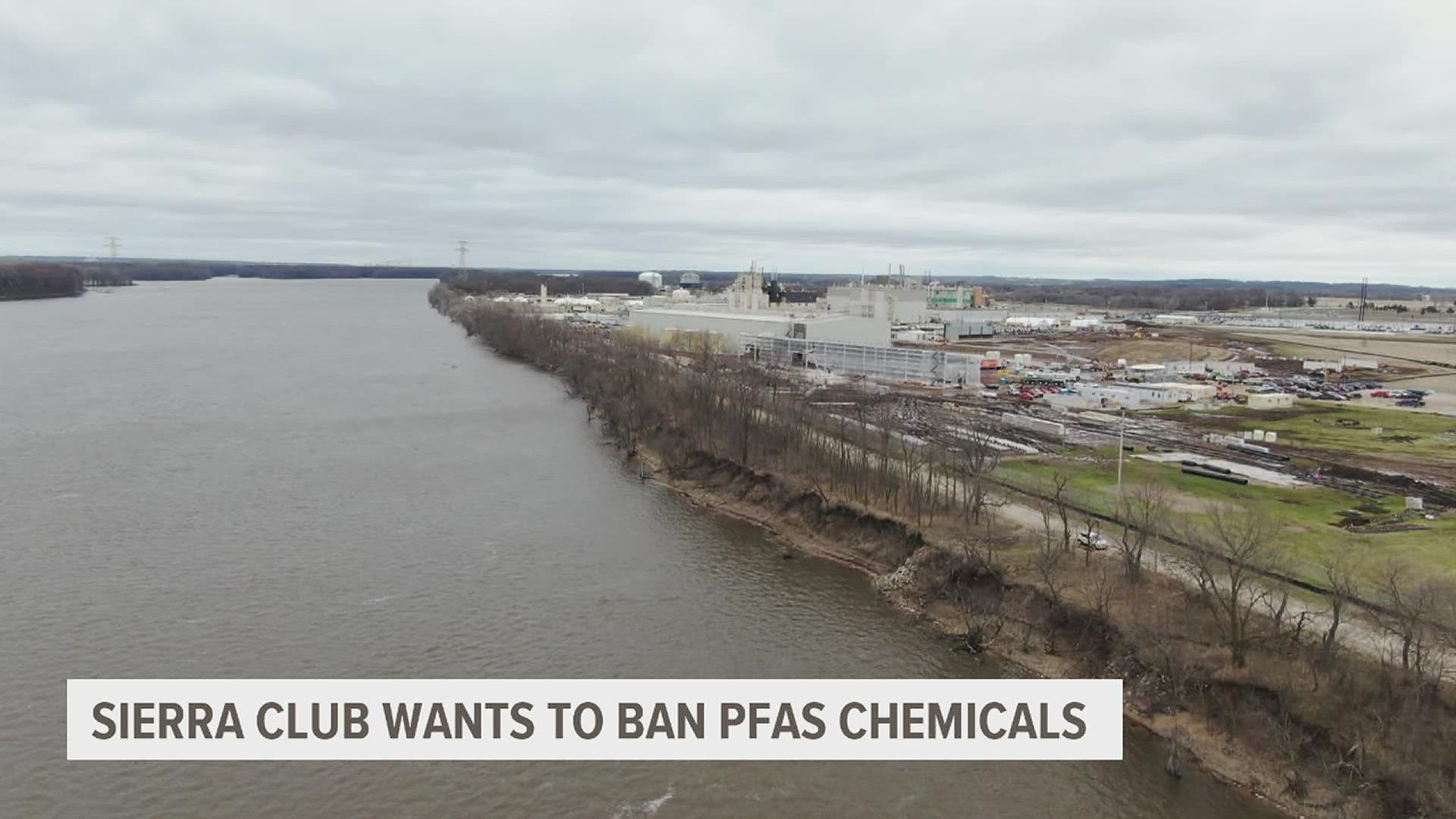CORDOVA, Ill. — Environmentalists say the federal, state and local governments need to do more to reduce the usage of a toxic synthetic chemical.
Perfluoroalkyl and polyfluoroalkyl (PFAS) chemicals have been in use since the 1940s. They're known as "forever chemicals" because they persist indefinitely in the environment.
PFAS chemicals are used to make non-stick pans, stain-resistant fabric, waterproof clothing and food packaging, among other products. They're also commonly found in firefighting foams used at airports, military bases, fire stations and fire training sites.
"They're showing alarming signs of harm to human bodies, to the environment," said Sonya Lunder, the Sierra Club's senior toxics policy advisor. "They can be measured in high levels in people's blood if they're drinking contaminated drinking water or eating food with these PFAS chemicals. And for that reason, there's kind of a global conversation about how to get them out of production, how to get them out of the environment, and how to address places where historic production and uses have caused contamination."
More than 16 million people in the U.S. have PFAS-contaminated drinking water, according to the Sierra Club.
PFAS exposure has been found to cause liver damage, decreased fertility, pregnancy-induced hypertension and/or preeclampsia as well as a variety of cancers.
"One of the most sensitive effects is, they studied children with high exposures to PFAS and found that their body's immune system doesn't work as strongly. And so when they get something like a routine vaccine for COVID or any other communicable disease, their body may not be able to mount that strong immune system defense," Lunder said. "These are incalculable harms or risks that we are posing to human health."
The Sierra Club believes there are safer alternatives to using PFAS chemicals, Lunder said.
PFAS is not currently listed as a hazardous compound or waste.
"The evidence has mounted over decades that the chemicals linger in our bodies," Lunder said. "As that scientific evidence has become more clear, we realize that incredibly low concentrations of the chemicals are harmful, if not deadly. And at the same time, the EPA says it's going to take several more years to list them as hazardous waste."
There are still a lot of questions about how much PFAS is safe to ingest, she said, but it's more important to focus on controlling the source of the environmental pollution to prevent long-term contamination.
The companies who are leaking PFAS into the water and air also need to be held accountable, Lunder added.
The latest company on that list is the 3M facility in Cordova.
The Illinois attorney general filed a lawsuit against 3M, alleging that it knowingly manufactured and used PFAS for years, contaminating the Mississippi River, residential wells and surface, ground and drinking water around its Cordova facility.
3M discharges an average of 8.1 million gallons of contaminated wastewater into the Mississippi River every day, according to the lawsuit.
Lunder finds this concerning. Over 18 million people rely on the Mississippi River for drinking water.
"The Mississippi is a huge river. It also touches so many states, so many drinking water systems, agriculture, many industries," she said. "So this is a place where we need to be keeping the pollution out of our lakes and rivers, instead of saying, how much is too much, especially with a chemical as persistent as PFAS that isn't going to degrade over time in any meaningful way."
Illinois is seeking to hold 3M liable for the cost of finding, monitoring and cleaning up the contamination. Lunder said 3M should be held accountable for the water pollution.
"Companies like 3M and Chemours and DuPont have continued to profit incredibly on these chemicals," she said. "We want accountability from the companies who invented and who profited off of making PFAS. We want them to take the maximum steps possible to end the pollution from their facility, rather than this burden that we put on people who say, is it okay to drink the water?"
Lunder added that the Sierra Club currently has a lot of questions about the disposal of and what to do with PFAS waste.
Illinois is considering a bill that would ban the incineration of PFAS.
"This is really trying to address the fact that there isn't a lot of science to show what happens when you incinerate PFAS," Lunder said. "They're actually very commonly used as firefighting chemicals to put out fires, so the idea of putting them in an incinerator doesn't make a lot of sense. And the methods aren't there to really gauge what the breakdown products are."
However, the Sierra Club doesn't believe the bill goes far enough to ban PFAS incineration. The legislation only bans the PFAS chemicals that are named in the Toxics Release Inventory which is a list of less than 200 chemicals out of thousands in the PFAS family.
The Illinois House and Senate both unanimously passed a nearly identical bill last year, but Gov. J.B. Pritzker ultimately vetoed it because of how incineration was defined.
The European Union has announced an effort to stop using PFAS chemicals by 2030, and the Sierra Club thinks this is a reasonable timeline for the U.S.
"We're seeing a lot of state momentum this year, and (it's) hopefully a place that we can head in the United States as well," Lunder said. "With a little bit of green chemistry and a little bit of intention, we think that the industry can just stop making fluorochemicals, and we can find safer and worthy substitutes."

